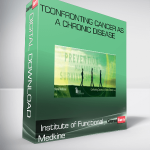Institute of Functional Medkine – Confronting Cancer as a Chronic Disease
$29.90
Insulin is a tumor promoter. High insulin levels (aka hyperinsulinemia) may lead to cancer through insulin’s effect on its receptor and the insulin‐like growth factor system. The effects of insulin and insulin‐like growth factor 1 on cancer development and progression have been demonstrated in both animal and human studies.
- Description
- Reviews (0)






Reviews
There are no reviews yet.